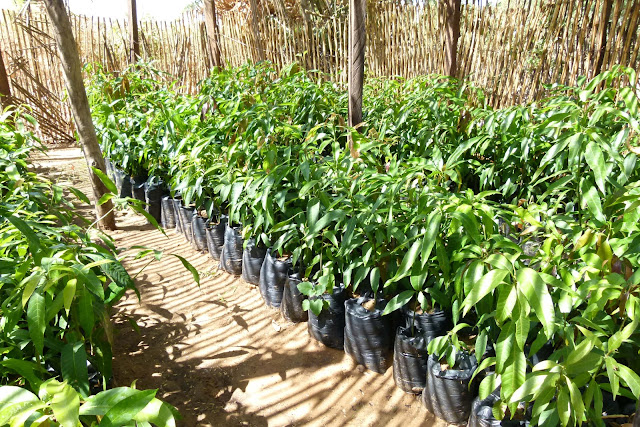You may remember the four women we profiled who had graduated and were working on starting their projects and businesses. You can get a glimpse of them here, and then click on their names if you'd like to read more about each one individually.
We are so happy that all four are going forward in working towards their goals. One of them, Reine, had a baby and has had a delayed start compared to the others as a result, but now that the baby has been born, she is ready to get to work!
The women who received the first four loans are on track to achieve their goals despite encountering a variety of real world challenges, such as floods, animal infections, etc. To help the women navigate the hurdles typically encountered in start-up ventures, and ensure success, the school is increasing its level of technical support for the women when they graduate and are getting started. An individual will be hired by Songhai, who will visit the farms twice a month at first, and then go down to once a month to make sure the women are getting the support they need. Songhai will pay the salary for this person, and EPN will cover field costs.
 |
| The four women graduates who were given the original disbursements. From left: Alice, Rebecca, Elvire, and Reine |
We are so happy that all four are going forward in working towards their goals. One of them, Reine, had a baby and has had a delayed start compared to the others as a result, but now that the baby has been born, she is ready to get to work!
The women who received the first four loans are on track to achieve their goals despite encountering a variety of real world challenges, such as floods, animal infections, etc. To help the women navigate the hurdles typically encountered in start-up ventures, and ensure success, the school is increasing its level of technical support for the women when they graduate and are getting started. An individual will be hired by Songhai, who will visit the farms twice a month at first, and then go down to once a month to make sure the women are getting the support they need. Songhai will pay the salary for this person, and EPN will cover field costs.
 |
| Rabbits being produced on Elvire's farm |
Perhaps one of the most exciting bits of news we have concerning Songhai is that the program has been so successful that they want to expand to more campuses. They are very happy with the Women's Capital Fund program, and there has been a spike in the number of women in the program as it has become known that there is funding and support available to them when they graduate to help them get started. Plans are being started to expand to two more Songhai campuses, and we couldn't be happier that the program is being so well received even as some of the growing pains are worked out.
There's a new group of women graduating and being given disbursements. We'll be introducing you to them here on the blog, so make sure to check back soon!












